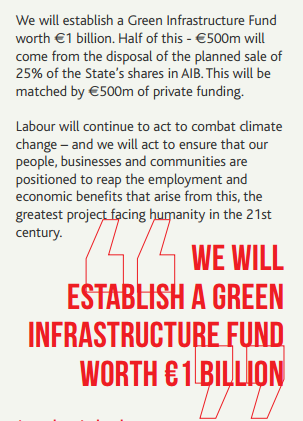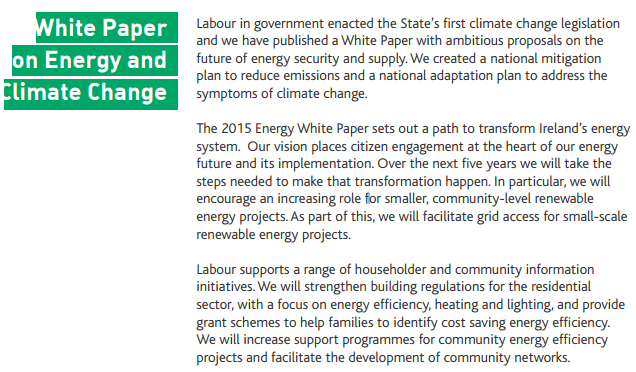Election Diary Feb 25th: Labour and Green Manifestos

February 25, 2016

In the final analysis of the environmental protection and climate mitigation policies to which political parties commit in their manifestos, we examine the Labour party and the Green party.
Labour Party
Infrastructure and Transport
 The Labour party has some ambitious plans to invest in sustainable infrastructure. They propose that our cities could become Carbon Neutral over the course of a 20-year plan. The details of this plan are not in the manifesto, however, so whether they plan to retrofit buildings and dramatically clean up urban transport systems, or offset emissions in cities with carbon sinks such as forestry in other locations is unclear.
The Labour party has some ambitious plans to invest in sustainable infrastructure. They propose that our cities could become Carbon Neutral over the course of a 20-year plan. The details of this plan are not in the manifesto, however, so whether they plan to retrofit buildings and dramatically clean up urban transport systems, or offset emissions in cities with carbon sinks such as forestry in other locations is unclear.
They would also establish a green infrastructure fund worth €1bn. This fund would contribute to a cleaner public transport system and energy efficiency measures which, along with the proposed Energy Efficiency Obligation Scheme aimed at builders suppliers would go a long way to ensuring improved efficiency in our buildings’ energy performances.
Their plans for clean transport enhancements include a Green Bus Fund, exploring the feasibility of electric inner-city rail and investing in cycle routes, but they are not specific enough on decarbonising the transport sector as a whole. While they intend to incentivise electric vehicles, they also aim to increase the number of compressed natural gas filling stations to encourage the infrastructure supporting this interim, slightly lower-carbon fuel, which Dr. Cara Augustenborg points out could stall development in renewables-powered transport.
Energy
Labour would replace coal burning in Moneypoint with “the most suitable replacement low-carbon technology by 2025”, which is a greater commitment than many other parties make in relation to this carbon-intensive energy generation plant. They would ban fracking and support community owned energy projects, based on the White Paper on Energy, released by Minister for Communications, Energy and Natural Resources, Alex White. They also support the development of affordable energy storage systems, which would complement expansion in renewable energy generation. In relation to the extraction of fossil fuels, 80% of which should remain in the ground according to climatologists, they do not propose a date for the end of this practice, but plan to gradually curtail oil and gas exploration.
They also support the development of affordable energy storage systems, which would complement expansion in renewable energy generation. In relation to the extraction of fossil fuels, 80% of which should remain in the ground according to climatologists, they do not propose a date for the end of this practice, but plan to gradually curtail oil and gas exploration.
Agriculture
The Labour manifesto fails to mention the link between agriculture and climate change, and does not state its position in relation to expansion plans of our agricultural sector under the Foodwise 2025 plan. Considering that this sector is responsible for 1/3 of our emissions, a large question mark looms as to how they would address this issue.
[x_button shape=”square” size=”regular” float=”none” href=”https://www.labour.ie/download/pdf/labour_manifesto_2016.pdf” info=”none” info_place=”top” info_trigger=”hover”]Click here to read the Labour Party’s Manifesto[/x_button]
The Green Party
Given the party’s position that the economy and society only function well when the natural systems upon which they depend are healthy, it is no surprise that the Green Party presents one of the strongest manifestos in terms of environmental protection and climate change.

Extract from Introduction to the Green Party Manifesto
Energy
The Greens have committed to decarbonising the energy system in full by 2050, closing Moneypoint and the remaining peat burning power stations within the lifetime of the next government, would put a price on solar to support suppliers to sell the energy to the grid, and not only are they against fracking but they would stop licensing for oil and gas exploration in Irish waters. They would incentivise a move away from oil fired central heating by expanding the SEAI Better Energy Warmer homes scheme, with an additional cost of €10m per annum.
Water Conservation
The Greens would keep Irish Water, but reduce their utilities role. They would hold a referendum to ensure that water and water infrastructure remain in public ownership, and allocate a ‘generous free allowance of water’ to every citizen but charge for excessive waste of water.
Agriculture
The party would aim to have 5% of Irish land in organic agriculture by 2021, encourage farmers to diversify into ‘polycultural’ grazing systems which reduce emissions and support biodiversity, reduce our reliance on imports and introduce legislation to ensure that misshapen food is no longer thrown away. However, the goal of achieving carbon neutrality in the agricultural sector by 2050 would require a rapid decrease in the national beef and dairy herd and supplementary mitigation measures, which is not laid out in sufficient detail in the manifesto.
Transport
The party plans to decarbonise the transport system by 2050, with an extensive public transport network and all private transport being electric by this stage. They would increase the network of charging points for electric vehicles, and allocate 10% of the transport budget to expanding the cycling network, in line with calls from the Dublin Cycling Campaign. Their approach to transport is holistic, whereby the National Transport Authority would influence residential planning process to reduce emissions associated with commuting to and from urban centres. They are not against private operators of transport services, but support the public ownership of roads and rail infrastructure.
One gaping hole in the manifesto is the failure to state the amount they would commit to the Green Climate Fund, important for realising the principle of Climate Justice. With Fianna Fáil proposing an increase by €13 million from the current annual level of €2million, the bar has been raised for the Greens. However, given that having a responsible approach to our environmental impact is a cornerstone of their principles, the likelihood is that this would extend to supporting developing countries to leapfrog fossil fuels in their trajectory of economic development.
[x_button shape=”square” size=”regular” float=”none” href=”https://greenparty.ie/wp-content/uploads/2016/02/Manifesto-Reads-3mm-marked-bleed.pdf” info=”none” info_place=”top” info_trigger=”hover”]Click here to read the Green Party’s manifesto[/x_button]
[x_button shape=”square” size=”regular” float=”none” href=”http://www.caraaugustenborg.com/news/election-2016-climate-manifesto-analysis” info=”none” info_place=”top” info_trigger=”hover”]For a more detailed analysis of all parties’ environmental credentials, visit caraaugustenborg.com[/x_button]
[x_author title=”About the Author”]







